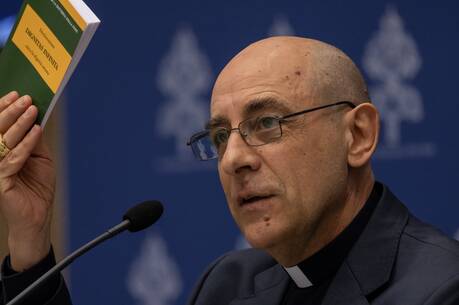
It’s a shame that Anglicans don’t have a Lourdes.
Let me explain.
This Pyrenean town in south-west France, built around a nineteenth-century vision of our Lady in the form of the Immaculate Conception, is the most visited religious place in the world after Mecca and Rome. Since 1989, there have been 5 million visitors a year, many of whom come with their dioceses or in groups, staying in the town’s 240 hotels. In 2004 – when Pope John Paul II visited – it was 6 million. This year, the 150th anniversary of the apparitions, so the Sanctuary’s extraordinarily helpful Press Office tells me, they are expecting a 20 per cent rise on that figure, bolstered by Pope Benedict’s visit in September.
These numbers are important, because here in Lourdes what you have -- in vast numbers -- are “ordinary” European Catholics: the kind of people who appeared suddenly in Rome for Pope John Paul II’s funeral, when cardinals asked each other, astonished, who these people were and where they came from. They are the kind of people whom media commentators – concerned as we are with figures of authority, or personalities, or people representing this or that wing or tendency – tend to overlook: the majority who make up the Catholic Church. They work, bring up their families, suffer, and believe.
They are the “people of no account” mentioned by St Paul as those to whom God chooses first to reveal Himself. They do not discuss doctrine, or ecclesiology, or theology. They don’t divide into liberals and conservatives. They pray the Rosary, sing Ave Marias, do the Stations of the Cross, attend Mass. They are eerily joyful. They are appreciative. They go to meet Our Lady. They care for one another. They tend to each other. They are patient; they are mischievous and generous and warm.
In Lourdes, they feel at home. This is their town. And Bernadette’s is their story.
The best way of describing Lourdes is “earthy”. The story at its heart is an immediately recognisable Gospel account of Our Lady in 1858 choosing to appear to a poverty-stricken asthmatic 14-year-old girl, and teaching her to pray. From this gracious eruption by an intercessor of the divine is unleashed a tide of prayer and hope and faith and healing which continues to defy the logic of secularization, just as in the nineteenth century it earned the scorn of the modernisers and the rationalists and the clergy who were embarrassed by the lack of sophistication of those who flocked here.
The Lourdes effect is that of communion: the dropping of barriers, the joy that comes with recognising our dependence on God and the cold insufficiency of our own means. Lourdes dissolves boundaries, and lowers the guard. It happens to me, usually, two or three days into my stay. The music, the long liturgies, the joyful crowds, the endless chanting of Ave Marias, the humiliation of the baths, and above all the presence everywhere of disability and illness in wheelchairs – they all work on the ego, melting it.
Here’s the thing: Lourdes unites people around the ordinary, the poor, and the vulnerable. In that focus, divisions dissolve; a sense of oneness supervenes. Our God-dependent humanity is what comes first. What matters is faith: even a poor faith, weakened by doubt and suspicion, is enough – as long as there’s the thirst in the hope.
And the basics of the faith are everywhere, in earthy symbols which tell the Gospel story through signs: the poverty of Bernadette, which forces her to go in search of firewood – the same poverty which causes humans to look for God; the stone of the Grotto -- God as a rock and fortress; the cave, where in the Bible God is to be found – by Moses or Elijah, or as the birthplace of Jesus in Bethlehem; water – the healing sign of the Holy Spirit; light – the candle which Bernadette takes to the Grotto, reminding us of Jesus as light of the world; and the sign of the Cross -- the first gesture of Bernadette when she sees Our Lady -- which speaks of the suffering redeemed and made meaningful by Christ.
That’s why there’s no tinkering, in Lourdes, with the basic stuff – the devotions, the Eucharist, Confession. Because these are time-honoured ways of allowing God to come close.
Too much cogitation, too much dwelling on intellectual complexities and absolute principles, can get in the way of all this. What Our Lady said to Bernadette was communicated in remarkably few words accompanied by a series of gracious gestures. She laughed when Bernadette produced a notepad to write down what she might say. You can’t tie down this stuff.
You can only choose to experience it, and let it transform you. And what results is that which the Anglican Church is desperately seeking: the unity which is a gift of the Spirit.
I don’t mean that by having no Lourdes they can’t receive that gift. But it helps to have a place like this, where communion happens by refocusing the mind and heart on the raw, divine-dependent, thirsty human condition – a unity which puts the malades in the center. That’s why Lourdes is especially good – and especially painful - for intellectuals, and theologians, and commentators and analysts, because the categories into which they (I mean, of course, we) like to divide up the world just don’t work here. Our Lady laughs at our notepads.
Memo to the Archbishop of Canterbury: bring your bishops here for a week. It’s the fastest route to the communion you seek.







